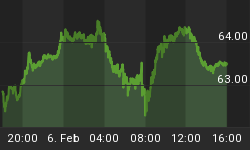Gold's Wall of Worry

This week gold fell from a high of $1390, achieved late on Sunday night European time, to a low of $1322 last night before rallying $15 on London's opening this morning. To put this fall in context, the gold price had increased by over $200 since 31st December, so the correction this week was about one third of the rise, normal in that context. The action was in gold rather than silver, whose trading volumes were subdued in comparison, and their relative performance in the year to date is shown in the chart above.
There were a number of factors undermining the gold price this week, including the following:
-
Ukraine/Crimea. Following the Crimea referendum the immediate threat of further escalation of the Ukrainian problem receded. This was a signal for profit-taking.
-
Overbought market. With the shorts substantially reduced, there were short-term bulls in the market, making it vulnerable to a bear raid which duly occurred.
-
China. Talk of copper-backed financing schemes in China undermined metal prices generally, and there were references to gold being used for this purpose as well. While it is known that Chinese speculators on the Mainland have used this facility it has also been suggested that many foreign speculators have also used metals to back a carry trade to invest in China. A considered analysis shows this story to have been overblown, given that estimated global stocks at less than two months' consumption appear reasonable. Furthermore, China's copper consumption is rising significantly as she invests in electricity infrastructure so she needs physical stocks.
-
FOMC meeting. Wednesday's statement following Janet Yellen's first FOMC meeting caused significant volatility in markets, with bond prices falling sharply, the USD rising, and equities tumbling. Markets took fright at the implication that interest rates would rise sooner than end-2015 and probably by a little more than discounted, while at the same time GDP growth might be slightly less than previously expected. Gold lost $30 on Wednesday alone. It should also be noted that following every FOMC meeting since June 2013 the gold price has fallen.
It's a pretty powerful list. The general tone of financial markets is tilting perhaps towards deflation. China is trying to slow monetary growth, leading to revised GDP forecasts, and possibly the end of her property bubble. To this we add the Fed's monetary policy, which on the basis of this week's FOMC meeting appears to be less inflationary in tone. In the cliché of old, gold is climbing a wall of worry.
All this is essentially short-term noise, so long as central banks continue to rely on printing money to rescue the global economy and the financial system at times of stress. A deflationary crisis will always provoke an inflationary response, and that is what the primary trend in gold and silver is all about.
Next week
- Monday. UK: Nationwide House Prices. Eurozone: Flash PMI. US: Flash Manufacturing PMI
- Tuesday. UK: BBA Mortgage Approvals, Input Prices, Output Prices, ONS House Prices, CBI Distributive Trades. US: S&P Case-Shiller Home Prices.
- Wednesday. UK: Current Account. US: Durable Goods Orders.
- Thursday. Eurozone: M3 Money Supply. UK: Retail Sales. US: Initial Claims, Pending Home Sales. Japan: CPI, Real Household Spending, Unemployment, Retail Sales.
- Friday. Eurozone: Business Climate Index, Consumer Sentiment, Economic Sentiment, Industrial Sentiment. US: Core PCE Price Index, Personal Income, Personal Spending.















